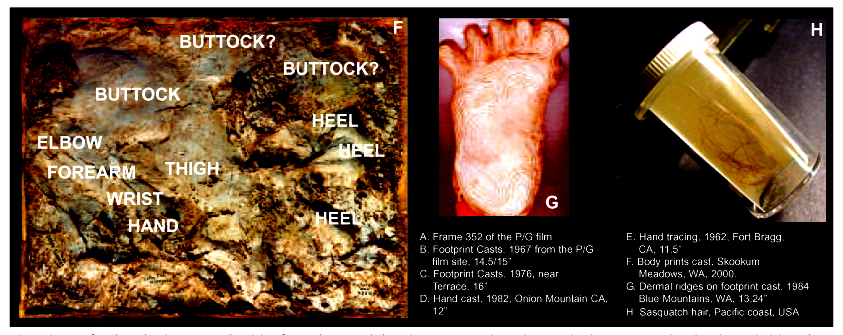Bigfoot Encounters
Do Sasquatch Really Exist?
By Christopher L. Murphy
For centuries the elusive sasquatch has been sighted throughout
A simple check on Google will return millions of results for the term “sasquatch” or “bigfoot.” Although all are not directly associated with the search for the creature, most are, and as such we can see the extent of interest in the subject.
Most certainly, it was the internet that brought the creature “out of the shadows” and at the same time provided us with thousands of sasquatch-related experiences which otherwise would have remained generally unknown.
With sightings and other sasquatch-related incidents going back hundreds of years, and reports now numbering in the thousands, one would think that by this time we would have either confirmed the creature's existence, or firmly established that it simply does not exist as a natural primate. However, the issue is far more complex than what is generally believed. Although indisputable evidence of the creature's existence has not been found to date, there continues to be enough additional evidence provided or discovered each year to maintain interest. Granted, most of this new evidence is simply, “more of the same” (sightings, footprints, hand prints, body prints and other traces—hair and feces). However, the number and distribution of incidents is in itself an important factor. It is one thing to say a sasquatch was sighted, but quite another to say it was sighted 100 times in as many different locations. Furthermore, improved “tools,” as it were, coupled with ever increasing general knowledge, enable us to glean little bits of additional information not available even two years ago.
As it presently stands, we have a mountain of evidence, but it its not enough to convince the scientific community to have a hard look at the issue. The major scientific organizations demand a body or bones. The irony here is that if such were found, we would no longer need these organizations to help us resolve the issue.
In some ways, I suppose, this situation itself provides an incentive for sasquatch researchers and witnesses. Every one of them would be able to say, I TOLD YOU SO! Little solace, I agree, but solace nonetheless.
The Most Convincing Evidence
I was recently asked what I thought was the most convincing evidence for sasquatch existence and why I considered such to be so. It is the second part of this question that is important. For certain, almost anything can be fabricated. However, when the circumstances are provided we are confronted with an entirely different situation—possibility must give way to probability.
The most convincing evidence is as follows. All of the categories carry about the same weight, so what I present is not in any specific order.
1. A one minute 16mm movie film taken in 1967 at

people, and the length of its legs in only one out of 1,000 people. The odds that a single human would have both of these characteristics is so remote as to be deemed impossible. Certainly, other professionals have examined the film and have expressed serious reservations, however, with all due respect, not one of them has been able to provide a scrap of evidence that proves the creature filmed was a fabrication. In the world of science, by the way, there is a bit of a double standard. A scientist can demand conclusive evidence, but cannot be demanded to provide the same. It is up to the person making the claim (whatever that might be) to prove he or she is right. The fact that a scientist can't prove to the contrary is essentially irrelevant. There have been other movies/videos taken of alleged sasquatch, none however, are of the quality of the film I am referring to. Furthermore they have not been subjected to the same scrutiny.
2. Large human-like footprints found in remote wilderness areas defy explanation. With an average length of 15.6 inches they are significantly different to bear prints. Characteristics of the prints indicate they were made by a primate of some sort. A human, of course, is a primate, however, the size of the prints and excessive weight needed to make them (depth of the impressions) essentially rules out humans as we currently know them to be. The fact that the prints indicate they were made with a flexible foot adds to their credibility. As to hoax considerations, given the quantity and distribution of the prints, hoaxing appears to be less probable than the conclusion that a sasquatch actually made the prints. It needs to be mentioned that prints range through what appear to be child-size up to mature adult size.
3. Large human-like hand prints found in both rural and remote wilderness areas cannot be associated with any known wild creature. Although somewhat rare, the size of some of the prints exceeds human norms. Again prints range in size, indicating children up to adults.
4. Prints of other body parts (beside footprints and hand prints) found in remote wilderness areas indicate that they were made by some sort of a primate. A clear set of large buttock prints in soft earth appears to match what would result if a very large and heavy man sat in the same spot. Furthermore, a full set of body prints showing various parts appears to indicate that a primate reclined in the area. A deep impression appears to show its heel and the back of its leg. It is reasoned that the creature probably dug its foot into the ground to reposition itself. Several professionals have examined a large plaster cast made from the prints and all agreed that the impressions appear to have been made by a primate. I will, however, acknowledge that at least one professional believes the prints were made by a known large animal (possibly an elk). Nevertheless, a hair found in the prints was not that of an elk and could not be associated with any other known animal. A hoax is essentially out of the question because the prints were found by a group of well-known and respected researchers who had actually baited the area in the hopes of attracting a sasquatch.
5. What appear to be dermal ridges (like fingerprints) observed in some footprint casts imply that the prints were made by a natural foot. The ridge patterns do not correspond to that of humans. To conclude that the ridges were fabricated (i.e., somehow provided in a fake foot) is highly improbable. Nevertheless, I will acknowledge that in one case it appears the ridges observed in a cast copy (note emphasis) were the result of plaster flow. In other words, the conditions were such that the plaster naturally formed lines that looked like dermal ridges. This is a very rare occurrence that I have never personally experienced. It was discovered by a researcher who was experimenting with plaster. We have to acknowledge that this can occur when casts are copied. That it could occur with original casts (cast taken directly from a footprint in the ground) is therefore possible. Nevertheless, we must weigh this against the fact that a sasquatch, like all primates, would have dermal ridges, and that such can (depending on the soil) transfer into a footprint and subsequently “register” in a plaster cast made of the print. We have at least one case where a researcher observed what appeared to be dermal ridges in a reasonably fresh footprint.

6. Hair samples found in areas where sasquatch have been observed, or footprints found, cannot be identified with known animal hair on record. The hair is human-like, has “native terminations” (has not been cut with an instrument) and lacks one major characteristic of human/primate hair—the presence of a discernible “medulla” (the inner or deep part). Although this is indeed very convincing evidence, it must be acknowledged that we do not have “on record” a sample of hair from every known animal in
7. Feces (droppings) found in remote areas does not appear to match that of known animals. In some cases, it is human-like (tubular), but the circumference is far too large for a human. Furthermore, the quantity greatly exceeds that of a normal human “evacuation.” Whatever made the feces had to be a “giant” of some sort. Analysis indicates that the diet is similar or the same as that of a bear (fruit, vegetables, animal matter). As a result, analysis results in the conclusion that it is “probably bear droppings.” Experienced outdoorsmen, however, point to the difference in configuration. In one case, unusual parasite eggs were found in a feces sample which had only been previously observed in some Northwest native tribal groups and animals (swine) along with humans in south/south west
8. Sound recordings of alleged sasquatch “chatter” and other vocalization cannot be matched with those of known animals. It has also been determined that some of the sounds were far beyond what could be made by a human, and were not made by some sort of an instrument (electronic or otherwise). Recently, one professional has emphatically stated that some “chattering” recorded (known as the Sierra sounds) is in fact a language of some sort. In other words, it is not just random or repeated sounds—it has structure.
9. Preliminary DNA analysis from a blood sample does not match either human or chimpanzee DNA. The blood was obtained from a trap set for the creature whereupon it stepped on a “screw board.” Several screws pierced the sole of its foot, and when it withdrew its foot, tissue and blood remained on the screws. I will mention here that the people who set the trap did not know they were dealing with a sasquatch. They just wanted to discourage some creature from breaking into their cabin and smashing things around. At this point, we just have a preliminary DNA finding. Much more work has to be done to confirm this finding.
The Situation
With this somewhat formidable list, one can appreciate the frustration sasquatch researchers face in not being able to resolve the issue. The matter is made even worse when misguided individuals purposely hoax sasquatch-related incidents for publicity.
Most certainly, the question as to why better evidence has not been obtained is very valid. However, there are reasonable answers. As to the creature's remains or bones, such are virtually impossible to find for any animal that has died of a natural cause, and the sasquatch being a very rare species in comparison greatly reduces the odds of finding its remains or bones. As to photographs/videos, they depend on one having a camera and being able to respond very quickly—sightings are unexpected and generally very brief. Camera traps have been used for many years, but any images I have seen are too poor for any scientific purpose.
Although one can still argue the point, especially given the size of the creature, we can look to other large animals which remained undetected for many years.
It is interesting to note that native people, whose stories and artwork of the creature pre-date written history, don't have a problem here. I have been told very intently by a native person, “You will never catch a sasquatch.” Natives simply accept the creature as an enigma—some kind of spiritual entity, not unlike ghosts (which, by the way, enjoy much greater “believability” than sasquatch do with non-native people).
Several hard-core sasquatch researchers throughout the years have, as a result of personal experiences, completely changed their minds on the nature of the creature. They now profess a modern version of native belief—that the creatures are paranormal in nature (dimension travelers). These researchers are not without a significant following. Many people claim to have had the same or similar experiences that they had.
Does the sasquatch exist? To the witnesses, researchers, and many native people: definitely. To the scientific community in general: absolutely not, and we are not interested in the matter. To the general public: highly mixed, but equally highly interested in the subject.


A stuffed toy of Quatchi, one of the 2010 Winter Olympics mascots, greeted visitors to the games. The mascot was also honored on a Canadian postage stamp. The fact that the toy was made in China is highly appropriate as it is from that ancient land that many believe the sasquatch originated.
My best,

 Chris Murphy has authored several books on sasquatch/bigfoot and has held two public museum exhibits displaying numerous artifacts and scientific findings. He has worked in conjunction with all of the major Pacific Coast researchers and has presented at numerous conferences. His books are published by Hancock House Publishers, Surrey, British Columbia, and his many papers and newsletters are on his blog at the Hancock House site: www.hancockhouse.com.
Chris Murphy has authored several books on sasquatch/bigfoot and has held two public museum exhibits displaying numerous artifacts and scientific findings. He has worked in conjunction with all of the major Pacific Coast researchers and has presented at numerous conferences. His books are published by Hancock House Publishers, Surrey, British Columbia, and his many papers and newsletters are on his blog at the Hancock House site: www.hancockhouse.com.
His Bigfoot/Sasquatch books:
Meet the Sasquatch (in association with John Green & Tom Steenburg). Hancock House, 2004
Know the Sasquatch: Sequel and update to Meet the Sasquatch. Hancock House, 2010
Bigfoot Encounters in Ohio: Quest for the Grassman (in association with Joedy Cook and George Clappison). Hancock House, 2006
The Bigfoot Film Controversy (with Roger Patterson posthumously -- Supplement by CLM. Hancock House, 2005
Bigfoot Film Journal: A Detailed Account & Analysis of the Patterson/Gimlin Film Circumstances & Aftermath. Hancock House, 2008
Chris Murphy was also a consultant or edited the following titles:
Giants, Cannibals & Monsters: Bigfoot in Native Culture. Kathy Moskowitz Strain. Hancock House, 2008
Who's Watching You? An Exploration of the Bigfoot Phenomenon in the Pacific Northwest. Linda Coil Suchy. Hancock House, 2009
Sasquatch/Bigfoot and the Mystery of the Wild Man: Cryptozoology in the Pacific Northwest. Jean-Paul Debenat, PhD. Hancock House, 2009
Bigfoot Encounters in New York & New England: Documented Evidence, Stranger than Fiction. Robert E. Bartholomew, PhD, and Paul B. Bartholomew, B.S. Hancock House, 2008
Bigfoot: To Kill or to Film: The Problem of Proof. Dmitri Bayanov. Pyramid Publications, 2001
Bigfoot: The Russian Vision. Dmitri Bayanov. Crypto-Logos Publishers, 2007. Note: This work will be republished by Hancock House this year (2010).
Back to Stories
Back to Bigfoot Encounters Main page
Back to Newspaper & Magazine Articles
Back to Bigfoot Encounters "What's New" page
Portions of this website are reprinted and sometimes edited to fit the standards of this website
under the Fair Use Doctrine of International Copyright Law
as educational material without benefit of financial gain.
http://www4.law.cornell.edu/uscode/17/107.html
This proviso is applicable throughout the entire Bigfoot Encounters Website.